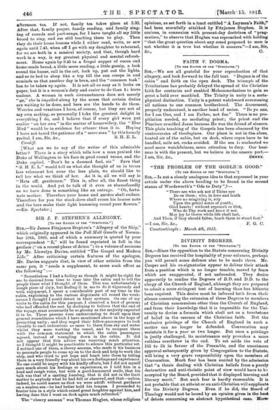SIR J. F. STEPHEN'S ALLEGORY.
[TO THE EDITQE OF THE "SPECTATOR."] SIR,—Sir James Fitzjames Stephen's "Allegory of the Ship," which originally appeared in the Pall Mall Gazette of Novem- ber 28th, 1868, and of which a summary is quoted by your correspondent " Z," will be found reprinted in full in the preface (" on a recent phase of deism") to a volume of sermons by Mr. Llewelyn Davies, entitled "The Gospel and Modern
Life." After criticising certain features of the apologue, Mr. Davies suggests that, in view of other articles from the same pen, it "needs a supplement, to some such effect as the following " :—
" Nevertheless I had a feeling as though it might be right for me to descend from time to time into the cabin and to tell the people there what I thought of them. This was unfortunately a rough piece of duty, but finding it in me to do it vigorously and with enjoyment, I spent a considerable part of my time in the cabin, explaining to the various disputants all round the weak- nesses I thought I could detect in their systems. On one of my visits to the cabin for this purpose. I observed a knot of persons who had offended the rest by declining to believe that the end of the voyage must necessarily be so gloomy as the majority expected it to be. These persons were endeavouring to dwell upon that general resemblance which I have mentioned above in the hope of promoting unity ; and they urged their fellow-passengers to look steadily to such indications as came to them from sky and water whilst they were working the vessel, and to compare these with the com.non statement in which the cabin passengers agreed, instead of wrangling down in the cabin. It did not appear that this advice was receiving much attention. so I thought it might be practicable to silence this particular set. noticed one of them, a cheery seaman, who made it his business to persuade people to come up on to the deck and help to work the *hip, and who tried to put hope and heart into them by telling them in a very friendly way about his own feelings and experiences. No one could be angry with his kindly efforts, but I did not myself are much about his feelings or experiences, so I told him in a loud and rough voice, but with a good-huinoured smile, that his talk was that of a canting humbug, that it did not in the least matter to anybody what he had felt or observed, and that—unless, indeed, he could assure us that we were adrift without guidance on a sunless sea—he had better hold his tongue. I proceeded to banter him in a style which raised great laughter against him, and Laving done this I went on deck again much refreshed."
The "cheery seaman" was Thomas Hughes, whose religions
opinions, as set forth in a tract entitled " A Layman's Faitb7 Lad -been scornfully attacked by Fitzjames. Stephen, It is qurione, in connexion with present-day doctrines of "prag, matism," to observe that Hughes was reproached with holding " that the great question about any creed proposed to men is not whether it is true but whether it answers."—I am, Sir,














































 Previous page
Previous page